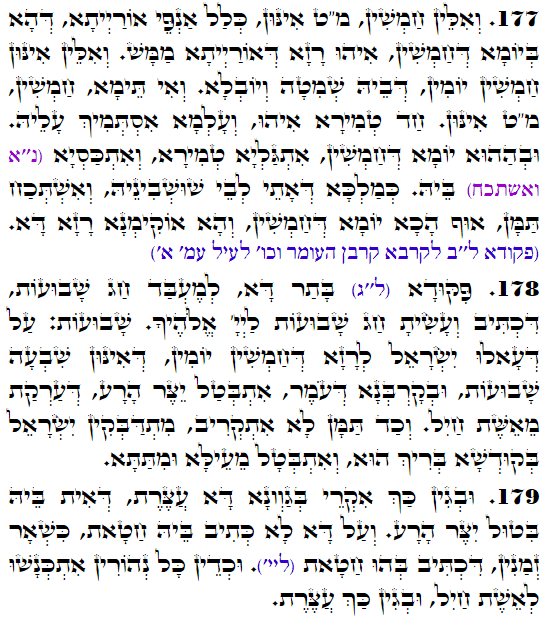Daily Zohar # 3952 – Emor – We stop after the seven
Daily Zohar 3952

Hebrew translation:
178. הַמִּצְוָה (ל”ג) שֶׁאַחַר זוֹ, לַעֲשׂוֹת חַג שָׁבוּעוֹת, שֶׁכָּתוּב (דברים טז) וְעָשִׂיתָ חַג שָׁבֻעוֹת לַה’ אֱלֹהֶיךָ. שָׁבוּעוֹת – עַל שֶׁנִּכְנְסוּ יִשְׂרָאֵל לְסוֹד חֲמִשִּׁים הַיָּמִים, שֶׁהֵם שִׁבְעָה שָׁבוּעוֹת, וּבְקָרְבַּן הָעֹמֶר הִתְבַּטֵּל יֵצֶר הָרָע, שֶׁבּוֹרֵחַ מֵאֵשֶׁת חַיִל. וּכְשֶׁשָּׁם לֹא נִקְרַב, מִתְדַּבְּקִים יִשְׂרָאֵל עִם הַקָּדוֹשׁ בָּרוּךְ הוּא, וּמִתְבַּטֵּל מִמַּעְלָה וּמִמַּטָּה.
179. וּמִשּׁוּם כָּךְ נִקְרָא בְּגָוֶן זֶה עֲצֶרֶת, שֶׁיֵּשׁ בּוֹ בִּטּוּל יֵצֶר הָרָע, וְעַל כֵּן לֹא כָתוּב בּוֹ חַטָּאת כְּמוֹ שְׁאָר הַזְּמַנִּים שֶׁכָּתוּב בָּהֶם חַטָּאת (לַה’). וְאָז כָּל הָאוֹרוֹת מִתְכַּנְּסִים לְאֵשֶׁת חַיִל, וּמִשּׁוּם כָּךְ עֲצֶרֶת.
.
Tomorrow is Lag L’Omer
To make a better connection read this page: Lag L’Omer Guide
Zohar Emor
Continued from previous DZ
#177
The forty-nine days are considered as 49 inner ‘faces’ of the Torah, and they are pure and the fiftieth day is the secret of the Torah as a whole. The fifty days include seven sabbaticals and one jubilee. We don’t count the fiftieth day because it is hidden, and the world depends on it. Shavuot is the fiftieth day, and the hidden is revealed and dresses the holiday.
During the 49 days of the Omer there, the aspect of the Klipa still exists, but on the fiftieth day, we reach Binah, the root of Zeir Anpin, which is called Torah, and the Klipot cannot have a hold at that level.
#178
Deuteronomy 16:10
“וְעָשִׂיתָ חַג שָׁבֻעוֹת לַיהוָה אֱלֹהֶיךָ מִסַּת נִדְבַת יָדְךָ אֲשֶׁר תִּתֵּן כַּאֲשֶׁר יְבָרֶכְךָ יְהוָה אֱלֹהֶיךָ.”
“Then you shall keep the Feast of Weeks to YHVH your God with the tribute of a freewill offering from your hand, which you shall give as YHVH your God blesses you.”
The Torah tells us to celebrate the holiday of Shavuot because Israel entered the secret of the fifty days, which is seven weeks, and the fiftieth day includes all seven weeks.
The fiftieth day is the fiftieth gate that is the secret of the level of Chokmah, Binah, and Da’at of Israel Sava and Tevuna that is the root for the seven weeks.
With the sacrifice of the Omer, that is, the offering of barley, the evil inclination is eliminated. It is the aspect of the promiscuous woman who flees from a woman of valor. When the evil is gone and doesn’t have a grip on Zeir Anpin and Malchut, Israel can cling to the Holy One, Blessed be He.
#179
Because of that, the day is called ‘assembly’ ‘עֲצֶרֶת’ because it has in it the void of the evil inclination. On this day, it doesn’t say to bring a sin offering like on other holidays because it includes a share for the other side, and there is no need to give them a share on this holiday because they were eliminated. Then the lights of the seven weeks gathered for the “woman of Valor,” which is Malchut. Because of that, the holiday is called “עֲצֶרֶת” “assembly.”
Lesson;
The word “עֲצֶרֶת” “assembly” has the root of “עצר,” which means “stop,” meaning that the other side is stopped and Israel has a stronger connection to HaShem.
{||}

 Previous: Emor
Previous: Emor
